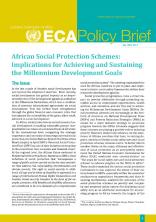ECA Policy Brief - Issue 03

In the last couple of decades social development has not received the attention it deserves. More recently, social development has gained impetus as an important objective of the development agenda as embodied in the Millennium Declaration, which was a combination of previous international agreements on social development. This has further been strengthened through the global financial and economic crisis that has exposed the vulnerability of the gains, albeit small, achieved in social development. In Africa, social protection as an instrument of social development in tackling vulnerable groups’ marginalization has taken on a renewed focus at all levels. At the international level, recognizing the strategic importance and necessity of ensuring universal social protection, the United Nations System Chief Executives Board adopted in April 2009 a Universal Social Protection Floor (SPF-I) as one of nine initiatives in response to the recent food, fuel, economic and financial crises. At the regional level, the African Union endorsed at Ministerial level in Windhoek, Namibia in 2008 a clear definition of social protection that “encompasses a range of public actions carried out by the state and others that address risk, vulnerability, discrimination and chronic poverty. The right to social security in childhood, old age and at times of disability is expressed in a range of international Human Rights Declarations and treaties. Social security transfers in the form of, for example, pensions, child benefit and disability allowances are considered to be core elements of a comprehensive social protection system”. The meeting emphasized the need for African countries to put in place and implement inclusive social policy frameworks, within their respective development agendas.